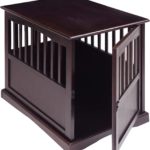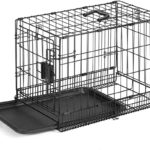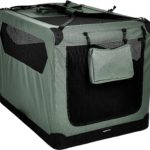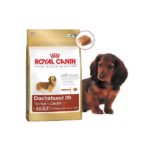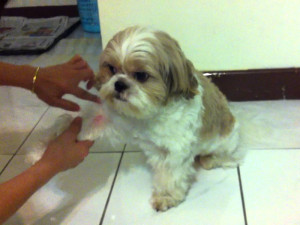When choosing a dog crate, there are several factors to consider:
- Size: Make sure the crate is large enough for your dog to stand up, turn around, and lie down comfortably.
- Material: Wire crates are durable and offer good ventilation, while plastic crates are lightweight and easy to clean. Soft-sided crates are also an option for travel.
- Safety: Look for a crate with secure locking mechanisms and sturdy construction.
- Portability: If you plan to travel with your dog, choose a crate that is easy to transport.
- Comfort: Look for a crate with comfortable and removable bedding or pad.
- Durability: Make sure the crate is made of high-quality materials that will withstand regular use.
It’s also important to note that puppies and small breeds may require a smaller crate than adult dogs, and it may be necessary to buy a larger crate as your dog grows.
How to choose the right size Dog Crate?
Choosing the right size of dog crate is important for the comfort and safety of your dog. Here are some factors to consider when choosing the right size of dog crate:
- Size of your dog: The size of the crate should be appropriate for your dog’s breed and size. A general rule of thumb is to choose a crate that will allow your dog to stand up, turn around, and lie down comfortably. Check image below.
- Growth potential: If you have a puppy, you will need to consider the size of the crate as your puppy grows. A divider panel can help adjust the size of the crate as your puppy grows.
- How it will be used: The size of the crate will depend on how it will be used. For example, if you plan to use the crate for travel, you will need a smaller size that is easy to transport.
- Space available in your house: If the crate is going to be in your house, you will need to consider the space you have available. You will need enough room for the crate and also enough room for your dog to move around it.
- Consider your dog’s habits: If your dog likes to stretch out when sleeping, you may need a larger crate to accommodate them. If your dog likes to curl up, a smaller crate may be sufficient.
It’s always a good idea to measure your dog and measure the space where the crate will be placed to get a sense of the size you need. You can also look at the crate manufacturers size chart for guidance and also consult with a veterinarian for a better recommendation.
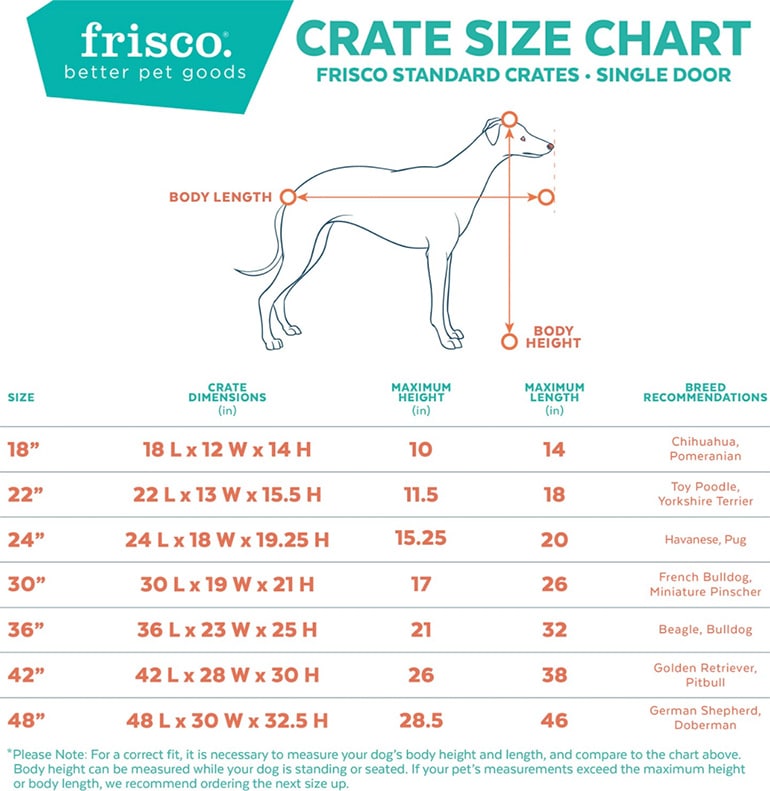
Furniture dog crates
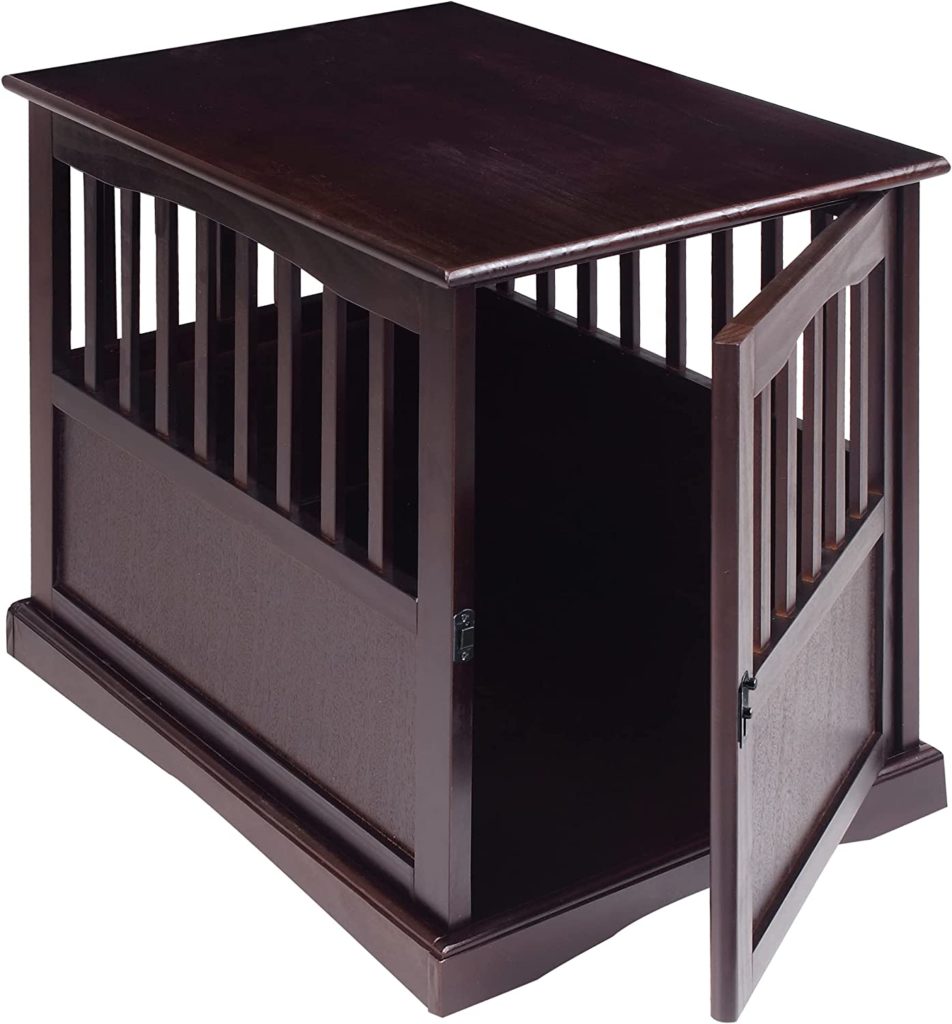
Pros of furniture crates:
- Stylish design: Furniture crates are designed to blend in with your home decor, making them a more attractive option than traditional metal or plastic crates.
- Doubles as a piece of furniture: These crates can be used as a side table, coffee table or even a TV stand, so they don’t take extra space in your home.
- Extra security: Some furniture crates are designed with locking mechanisms or latches that provide added security and peace of mind.
- Durable: Furniture crates are often made of sturdy materials like wood or metal, which can withstand regular use.
Cons of furniture crates:
- Expensive: Furniture crates are often more expensive than traditional crates, making them a more expensive option.
- Limited sizes: Furniture crates may not come in as many sizes as traditional crates, so it may be difficult to find the perfect fit for your dog.
- Heavy and difficult to move: Furniture crates can be quite heavy, making them difficult to move around your home.
- Not as ventilated as wire crates: Furniture crates may not provide as much ventilation as wire crates, which can be less comfortable for your dog.
- Limited access: Some furniture crates have limited access to the interior, which can be inconvenient if you need to regularly clean or access the inside of the crate.
It’s important to consider your dog’s needs and habits, as well as your own aesthetic preferences and budget when deciding whether a furniture crate is the right option for you.
Wire Dog Crates
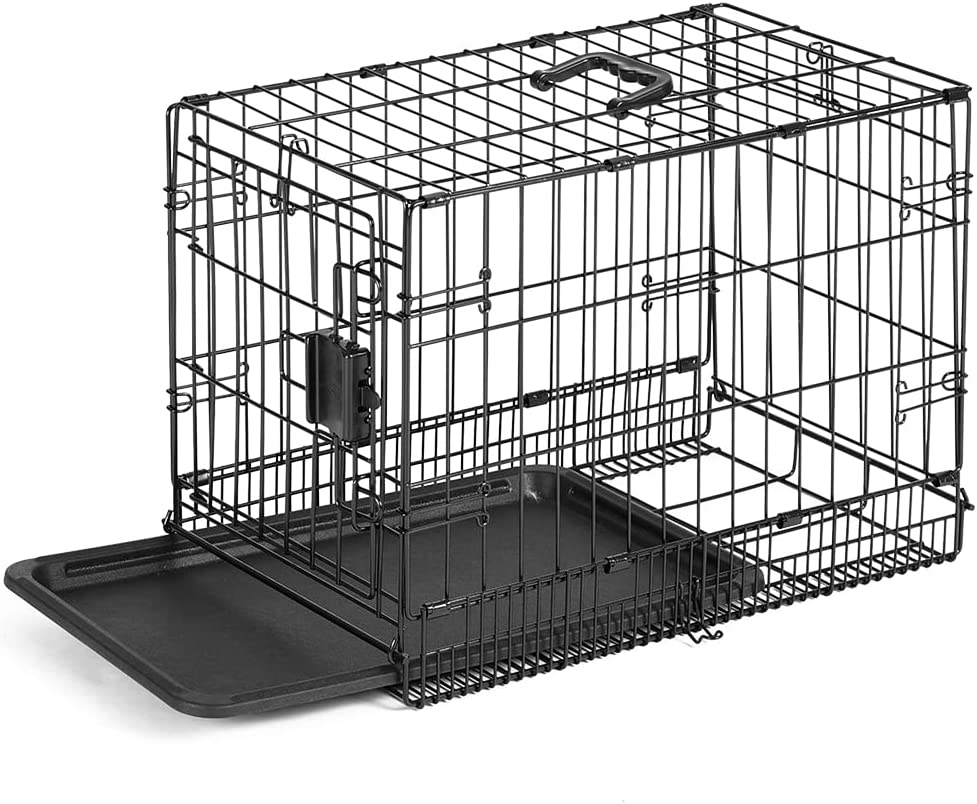
Pros of wire dog crates:
- Good ventilation: Wire crates offer good airflow, which can help keep your dog cool and comfortable.
- Durable: Wire crates are typically made of sturdy materials that can withstand regular use.
- Visibility: Wire crates allow your dog to see their surroundings, which can help reduce anxiety.
- Easy to clean: Wire crates can be easily cleaned with a hose or damp cloth.
- Stackable: Some wire crates can be stacked, which can save space if you have multiple dogs.
Cons of wire dog crates:
- Not as private: Wire crates do not provide as much privacy as plastic or soft-sided crates.
- Not as portable: Wire crates can be heavy and bulky, making them less convenient for travel.
- Rust: Some wire crates can rust over time if not properly maintained.
- Escape-prone: Some dogs can bend or chew the wires of the crates, making it easier for them to escape.
- Not suitable for dogs with separation anxiety: Dogs with separation anxiety may be more stressed in a wire crate where they can see outside or being in an open space.
It’s important to evaluate your dog’s needs and habits before making a decision. You should also measure your living space and consider how the crate will fit into your home.
Soft Dog Crates
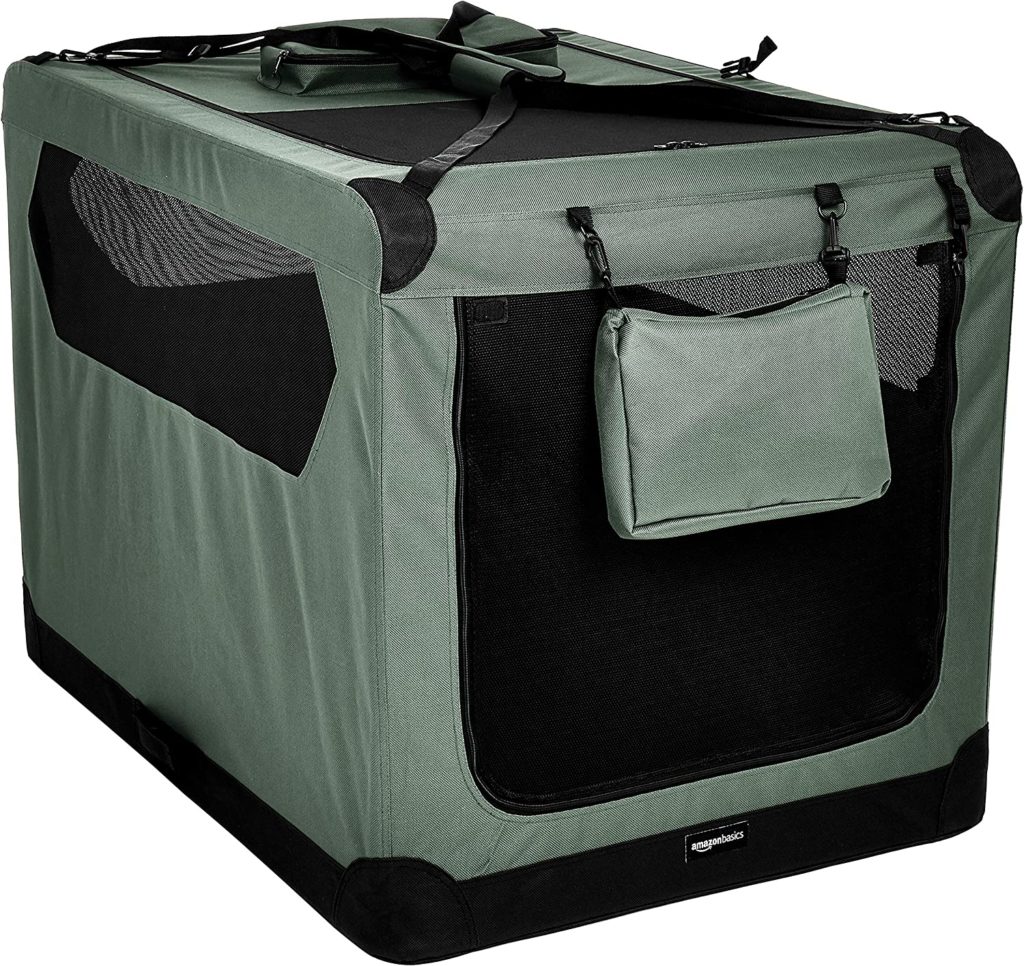
Pros of soft dog crates:
- Lightweight and portable: Soft crates are lightweight and easy to carry, making them a great option for travel.
- Durable: Soft crates are made of durable, water-resistant fabrics that can withstand regular use.
- Comfortable: Soft crates often come with padded floors and walls, which can provide added comfort for your dog.
- Easy to clean: Soft crates can be easily cleaned with a damp cloth or machine washed.
- Variety of designs: There are many different designs and colors available, so you can find a crate that matches your style.
Cons of soft dog crates:
- Not as secure: Soft crates may not provide as much security as wire or plastic crates, and some dogs may be able to chew or scratch through the fabric.
- Less ventilated: Soft crates do not provide as much ventilation as wire crates, which can make them less comfortable for your dog in hot weather.
- Not as sturdy: Soft crates are not as sturdy as wire or plastic crates, and may not be as durable in the long term.
- Limited size availability: Soft crates may not come in as many sizes as traditional crates, so it may be difficult to find the perfect fit for your dog.
- Not suitable for dogs with Separation anxiety: Dogs with separation anxiety may be more stressed in a soft crate where they can see outside or being in an open space.
It’s important to consider your dog’s needs and habits, as well as your own lifestyle and travel plans, when deciding whether a soft crate is the right option for you.
Do I need Dog Crate Accessories?
Whether or not you need dog crate accessories depends on your individual needs and the needs of your dog. Some accessories can be very useful in making your dog’s crate experience more comfortable, while others may not be necessary. Here are some examples of dog crate accessories and the pros and cons of each:
- Crate covers: Crate covers can provide added privacy and security for your dog, as well as help to block out light and noise. They can also help to keep your dog warmer in cold weather.
- Crate mats or pads: These can provide added comfort for your dog and can help to keep the crate cleaner.
- Crate dividers: If you have a puppy or a growing dog, a divider can help to adjust the size of the crate as your dog grows.
- Food and water bowls: These are essential for providing your dog with food and water while in the crate.
- Toys and chews: These can help keep your dog entertained and occupied while in the crate.
- Dog diapers: If your dog is not fully house trained, dog diapers can help to keep the crate clean.
- Camera: Some pet owners use a camera to keep an eye on their pet while they’re away, this can be helpful if you have a dog with separation anxiety.
It is important to evaluate your dog’s needs and habits and also to consider your own lifestyle and budget before purchasing any crate accessories.
Summary
A dog crate can be a useful tool for a variety of situations, such as:
- House training: A crate can provide a safe and secure space for your puppy or new dog to learn the rules of your home, and also to prevent any accidents while you are not there.
- Travel: A crate is a safe and secure way to transport your dog by car or plane.
- Safety: A crate can provide a safe space for your dog during times when you are not able to supervise them, such as when you are away from home or when you have visitors.
- Separation anxiety: A crate can provide a safe and secure space for dogs who have separation anxiety and are stressed when left alone.
- Medical recovery: A crate can provide a safe and secure space for dogs who are recovering from injury or surgery.
- Behavioral issues: A crate can be used as a tool for managing behavioral issues such as destructive chewing or excessive barking.
It is important to remember that using a crate should always be a positive experience for your dog, and it should never be used as a punishment or as a way to isolate your dog for long periods of time.
